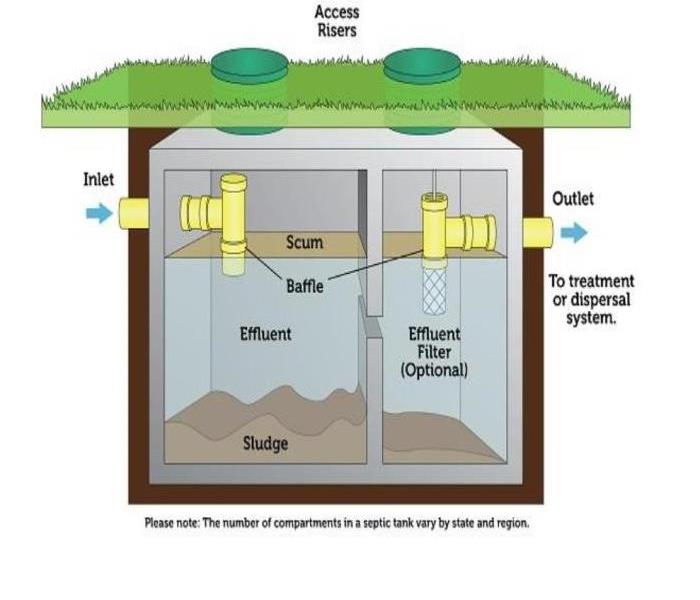Do you Have a Septic Tank in your Riverside Home?
1/27/2021 (Permalink)
We don't run into too many septic system overflows in this part of Riverside, but if you happen to live or have a property in a rural area, for sure you have an idea about how septic tanks and the septic systems work.
One way you’ll know if it’s maintained properly is if you don’t smell anything unpleasant coming from it. Now, there are a number of crucial do’s and don’ts to live by to ensure that your septic tank will last for as long as possible and that your septic system works the way it should. Here they are.
DO use high-quality toilet tissue only.
When shopping for toiletries, pick a toilet tissue that’s been proven to break up easily when wet. This way, it won’t cause any trouble when it’s already in your septic tank.
DO keep trees away from the septic system.
There are trees which have roots that grow and extend aggressively. They should be kept far from the septic system to avoid any damage. You can plant grass instead in the drainfield area to prevent and minimize the instances of soil erosion.
DO divert rainwater away from the drainfield.
When the drainfield is soggy, it would have challenges in absorbing liquid wastes. To prevent this, landscaping and foundation drains should be planned and executed accurately. Consult a professional regarding this matter.
DO perform regular maintenance.
Make sure your septic tank is maintained every one to three years by a professional. Now, the frequency of having your septic tank pumped will depend on its size, the amount of solids that go into it, and the volume of wastewater. It’s best to consult a professional again to know how often you should have your septic tank maintenance done.
DON’T allow an excessive amount of water to be discharged into the septic system.
It will cause the system to back up and will also affect the biological balance within the septic tank.
DON’T dump grease down the drain.
Grease can build up in the septic tank and plug the sewer pipes. So be sure it doesn’t find its way on the drain by having a separate container for it.
Have you Experienced Septic Tank Issues? Here's what you should know
Watch out: sewage spills contain contaminants that can cause serious illness or disease. Disease causing agents in raw sewage include bacteria, fungi, parasites, and viruses and can cause serious illnesses including Hepatitis A.
If a building has been flooded by sewage or wastewater there may be unsafe electrical wiring, bacterial and pathogen hazards, mold hazards, even unsafe mechanical systems.
- Turn off electrical power in the area that has been flooded if there is any chance of electrical wires, extension cords, or electrical appliances or fixtures coming in contact with standing water or wet materials
- Vacate sewage-contaminated areas right away. Areas of sewage spill should not be occupied by people who are not wearing appropriate protective equipment as they are dangerous:
- Stop flushing toilets
- Turn off running water that is sending water into the drain system (clothes washer, sinks etc)
If the sewage or wastewater are being spread by water from a burst plumbing supply or hot water heating pipe, turn off the water to the building and if needed for safety or to stop further you may also need to turn off the (hot water or steam) heating system.
Items that have been soaked and are not salvageable may best be placed outdoors. By removing wet and contaminated materials from the building it may be easier to inspect, repair leaks, and clean the building itself.
Watch out: do not handle sewage-contaminated materials without proper personal safety protection: there are bacterial, pathogenic, respiratory and infection hazards.
- Act promptly.
- Watch out: The longer that sewage waters remain in a building or on its contents the greater the chance of spreading illness or disease and the greater the chance of causing a costly mold contamination problem in addition to the sewage problem. High indoor moisture caused by standing water can cause mold contamination to form on other building surfaces even if they were not directly wet by the sewage spill.
- Don't panic: while prompt action is needed as we just explained, don't be in such a rush that you do something dangerous. Also, if you sound terrified when calling a contractor for assistance the result may be the imposition of inappropriate or costly steps.
- Call a professional water damage restoration authority - For other than a trivial spill on a tiled bathroom floor you may need help from a professional water damage or restoration company.
- Notify your insurance company that there has been a sewage spill in the building
- Notify your municipal authority or sewer department if your home is connected to a public sewer
- Contact your local health department for advice if your home is connected to a private septic system
SERVPRO of Riverside City has the certification to handle sewage leak. We are here to help!






 24/7 Emergency Service
24/7 Emergency Service
